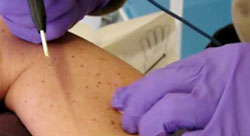St.Mellion Clinic is one of the leading mole removal centers in the Manchester area. Dr. Patel, the leading physician, has accrued expertise over the last eight years of working at the clinic. Patients that have had mole removals done at St. Mellion have been pleased with the level of care they have received. Patients can also have warts, skin tags and skin lesions treated if they need. Given that great reviews that St. Mellion come in by the bundle, numerous patients are starting to visit it every year. They are always informed about the different procedures available as well as the proper care that follows the procedure.

Radiosurgery for Mole Removal
One of the reasons behind St. Mellion’s success is the innovative medical technology used to treat dermatological conditions. In order to conduct mole removals they use radiosurgery. Unlike the traditional technique that makes use of a scalpel to shave the mole off, radiosurgery utilizes radio waves to perform the mole removal. This means that the radio waves pass through the skin similar to lasers, using the low temperature waves from the radio bandwidth. This means that the skin isn’t burned, yet can be penetrated successfully in order to get rid of the mole. Since radiosurgery doesn’t damage the tissue excessively, patients can look forward to recovering much faster as opposed to opting for a surgery involving an incision and stitches. There is absolutely no pain, bleeding or risk of infection associated with radiosurgery.
How to Prepare for Radiosurgery
Just like any other mole removal procedure, you must get prepared before having radiosurgery done. You should first visit St. Mellion and see Dr. Patel in order to be evaluated. Your clinical history should be available in order to find out if there are any past conditions that might prevent you from undergoing radiosurgery. The procedure is highly effective and patients all over the country are starting to have their moles removed with radiosurgery. Some of the precautions to take prior to surgery include:
- Have a light meal on the day of your scheduled radiosurgery
- Avoid taking vitamin E, aspirin or ibuprofen for two weeks before
- Make sure to have a friend or relative pick you up at the clinic in order to take you home
- All mole removal procedures require you to wear gauze, radiosurgery is no different
Aftercare Instructions
It’s important that you follow the aftercare instructions that the physician gives you. Every mole removal procedure comes along with a set of instructions and recommendations that you should follow if you want to heal properly. Even though radiosurgery is one of the latest advances in mole removal procedures, make sure to take the following instructions into consideration:
- Do not lift or strain yourself for at least a full week after your surgery
- Replace gauze frequently
- Always keep the treated area clean, you may use Q-tips
- Apply antibiotic cream as prescribed
- If you start bleeding, apply pressure for at least half an hour, if it doesn’t stop visit the ER
